|
|
|
Sort Order |
|
|
|
Items / Page
|
|
|
|
|
|
|
| Srl | Item |
| 1 |
ID:
123018
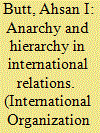

|
|
|
|
|
| Publication |
2013.
|
| Summary/Abstract |
This article questions the validity of anarchy as an assumption in International Relations theory. Powerful states often provide public goods to smaller states in return for their acquiescence on matters of interest. This transactional provision of public goods is analogous to how central governments behave in domestic environments; thus the hierarchic structure of domestic politics is replicated in international politics. The anarchy-hierarchy distinction, which rests on a neat separation of international and domestic structures, is therefore highly contentious. One public good that great powers provide, largely ignored by the literature on hierarchy, is justice. Powerful states can provide a forum for aggrieved parties to settle their disputes, and thus contain conflicts before they escalate to war. If such a forum is no longer provided, the system reverts to anarchy, where escalation-and therefore, war-is more likely. South America's war-prone decade can be explained by the variation in structural conditions on the continent. Due to the Depression, its Good Neighbor policy, and the onset of World War II, the United States was less interested in South American affairs in the 1930s, resulting in a more anarchic structure and a higher propensity for war.
|
|
|
|
|
|
|
|
|
|
|
|
|
|
|
|
| 2 |
ID:
096159


|
|
|
|
|
| Publication |
2010.
|
| Summary/Abstract |
Contend that contrary to traditional notions of a weak national state in our nation's early years, the national state, acting through the Army, was indispensable in shaping the pattern and direction of economic development. They propose a new way of conceptualizing the early American state: a state of the periphery, dominated by the Army, and a state of the center, in which other public institutions also performed key development functions.
|
|
|
|
|
|
|
|
|
|
|
|
|
|
|
|
| 3 |
ID:
100948
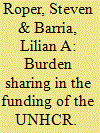

|
|
|
|
|
| Publication |
2010.
|
| Summary/Abstract |
The authors apply the theory of collective action and alliance behavior first developed by Olson and Zeckhauser and later extended by Sandler in a series of studies to test whether the nature of refugee protection influences state motivations to provide contributions. The authors investigate whether refugee protection can be viewed as a pure public good with the concomitant problem of free riding leading to suboptimal outcomes or whether contributions provide states private benefits that transform the nature of the good. Using a Heckman selection model, they test for the determinants of state contributions to the United Nations High Commissioner for Refugees and find that refugee protection offers several private benefits, indicating that it is best understood as an impure public good. They conclude, however, that even when states are able to secure these private benefits, it does not necessarily lead to the optimal provision of refugee protection.
|
|
|
|
|
|
|
|
|
|
|
|
|
|
|
|
| 4 |
ID:
100954


|
|
|
|
|
| Publication |
2010.
|
| Summary/Abstract |
What is the case for defence and is it a worthwhile investment? This question is addressed for two contrasting nations, namely, the UK and New Zealand. Economists have a set of standard analytical tools for addressing the question but they are difficult to operationalise. This paper provides policy-relevant answers.
|
|
|
|
|
|
|
|
|
|
|
|
|
|
|
|
| 5 |
ID:
124958
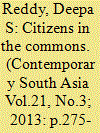

|
|
|
|
|
| Publication |
2013.
|
| Summary/Abstract |
This essay is based on ethnographic fieldwork conducted with the Indian community in Houston, as part of a National Institutes of Health and the National Human Genome Research Institute-sponsored ethics study and sample collection initiative entitled 'Indian and Hindu Perspectives on Genetic Variation Research'. Taking a cue from my Indian interlocutors who largely support and readily respond to such initiatives on the grounds that they will undoubtedly serve 'humanity' and the common good, I explore notions of the commons that are created in the process of soliciting blood for genetic research. How does blood become the stuff of which a civic discourse is made? How do idealistic individual appeals to donate blood, ethics research protocols, open-source databases, debates on approaches to genetic research, patents and Intellectual Property regulations, markets and the nation-state itself variously engage, limit or further ideas of the common good? Moving much as my interlocutors do, between India and the USA, I explore the nature of the commons that is both imagined and pragmatically reckoned in both local and global diasporic contexts
|
|
|
|
|
|
|
|
|
|
|
|
|
|
|
|
| 6 |
ID:
087437
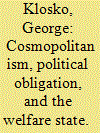

|
|
|
|
|
| Publication |
2009.
|
| Summary/Abstract |
While we generally take it for granted that governments should provide social welfare and other benefits to their citizens, justification of these services depends on special moral requirements people owe to their compatriots, as opposed to inhabitants of other countries, who may be far more needy. While widely discussed defenses of compatriot preferences can be seen to be flawed, the latter may be justified through a public goods argument. Security and other public goods are not only necessary for acceptable lives but are provided through the cooperative activity of compatriots, coordinated and enforced by the state. Because the necessary public goods require general cooperation throughout society, all individuals who are required to comply should have rights to participate in decisions about the form in which they are provided. Because these political rights must be substantive rather than merely formal, they justify requirements of distributive justice and so compatriot preferences.
|
|
|
|
|
|
|
|
|
|
|
|
|
|
|
|
| 7 |
ID:
173005
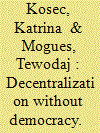

|
|
|
|
|
| Summary/Abstract |
Increasingly, decentralization is being adopted by countries in which assumptions made by formal models of decentralization, such as electoral accountability and population mobility, fail to hold. How does decentralization affect public service delivery in such contexts? The authors exploit the partial rollout of decentralization in the autocratic context of Ethiopia and use a spatial regression discontinuity design to identify its effects. Decentralization improves delivery of productive services, specifically, agricultural services, but has no effect on social services, specifically, drinking water services. This finding is consistent with a model in which local leaders have superior information about the public investments that will deliver the greatest returns and they are incentivized by decentralization to maximize citizens’ production—on which rents depend—rather than citizens’ utility. These findings shed light on nonelectoral mechanisms through which decentralization affects public goods provision and help to explain decentralization’s mixed effects in many nondemocratic settings.
|
|
|
|
|
|
|
|
|
|
|
|
|
|
|
|
| 8 |
ID:
069857


|
|
|
| 9 |
ID:
145106
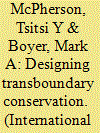

|
|
|
|
|
| Summary/Abstract |
The aim of biodiversity conservation is the protection of flora and fauna. Within the borders of a given state, such protection is usually facilitated by national laws. In the last 50 years, international legal instruments have sought to recognize transboundary ecological degradation. Solutions need to address the globalization of ecological damage through a paradigm shift in the conceptualization of state sovereignty and biodiversity. The boundary conflicts between Venezuela/Guyana and Guyana/Suriname are examined here for a conceptualized transboundary conservation initiative termed the Guiana Shield Ecoregion Reserve (GSER). Public goods theory is applied to facilitate greater understanding of the value of ecosystem services, carbon sequestration, and similar outputs from ecosystems. The proposal for a GSER might serve as a model for other transboundary conflicts where biodiversity conservation and its implicit provisioning of public goods might be a uniting paradigm for action.
|
|
|
|
|
|
|
|
|
|
|
|
|
|
|
|
| 10 |
ID:
085418


|
|
|
|
|
| Publication |
2008.
|
| Summary/Abstract |
We use the theory of two-level games to explore how domestic constraints affect the outcome of bargaining games over national contributions to an international public good such as global climate change, and to discuss the implications for the Schelling conjecture. We model the international negotiations on two dimensions-domestic and foreign contributions to the international public good-and extend the basic two-level model by examining a nonzero sum, two-dimensional conflict model on level one that includes characteristics of both conflict and cooperation. Our main results suggest that if the domestic game is a ratification game (as in the presidential system of the US), then contributions do not exceed those in a benchmark game without domestic constraints. But if the domestic game is an election game (which is more important in the parliamentary system of most continental-European countries), contributions can actually be higher than the benchmark.
|
|
|
|
|
|
|
|
|
|
|
|
|
|
|
|
| 11 |
ID:
113327
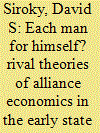

|
|
|
|
|
| Publication |
2012.
|
| Summary/Abstract |
When military alliances are expensive, they naturally raise distributional issues. This article considers two theories to explain how much a state will voluntarily contribute to the economic burdens of defense. Empirical work has relied largely on data from the twentieth century. This article provides an out-of-sample test to evaluate the models. Using data on the Quintuple Alliance, the results are more consistent with the predictions of the joint products model than the pure public goods model. Due to credible commitment problems, and intra-alliance cleavages, I argue that we should not expect substantial free riding in most conventional military alliances.
|
|
|
|
|
|
|
|
|
|
|
|
|
|
|
|
| 12 |
ID:
153065
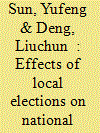

|
|
|
|
|
| Summary/Abstract |
In this paper, we study the domestic political determinants of military spending. Our conceptual framework suggests that power distribution over local and central governments influences the government provision of national public goods, in our context, military expenditure. Drawing on a large cross-country panel, we demonstrate that having local elections will decrease a country’s military expenditure markedly, controlling for other political and economic variables. According to our preferred estimates, a country’s military expenditure is on average 20% lower if its state government officials are locally elected, which is consistent with our theoretical prediction.
|
|
|
|
|
|
|
|
|
|
|
|
|
|
|
|
| 13 |
ID:
160561
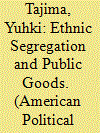

|
|
|
|
|
| Summary/Abstract |
This article contributes to the study of ethnic diversity and public goods provision by assessing the role of the spatial distribution of ethnic groups. Through a new theory that we call spatial interdependence, we argue that the segregation of ethnic groups can reduce or even neutralize the “diversity penalty” in public goods provision that results from ethnic fractionalization. This is because local segregation allows communities to use disparities in the level of public goods compared with other communities as leverage when advocating for more public goods for themselves, thereby ratcheting up the level of public goods across communities. We test this prediction on highly disaggregated data from Indonesia and find strong support that, controlling for ethnic fractionalization, segregated communities have higher levels of public goods. This has an important and underexplored implication: decentralization disadvantages integrated communities vis-à-vis their more segregated counterparts.
|
|
|
|
|
|
|
|
|
|
|
|
|
|
|
|
| 14 |
ID:
182684
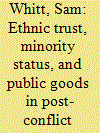

|
|
|
|
|
| Summary/Abstract |
This study considers how ethnic trust and minority status can impact the ability of ethnic groups to pursue cooperative public goods, focusing on groups with a history of conflict and lingering hostility. A public good experiment between ethnic Albanians and Serbs in postwar Kosovo reveals that subjects contribute far more to a mutually beneficial public good when they are part of an experimentally induced coethnic majority. However, when in the minority, subjects not only underinvest, but many actively divest entirely, privatizing the public good. Majority/minority status also has wide-ranging implications for how individuals relate to real-world public goods and the institutions of government that provide them. Compared to majority Albanians, survey data indicate how minority Serbs in Kosovo express greater safety and security concerns, feel more politically, socially, and economically excluded, are more dissatisfied with civil liberties and human rights protections, and are less likely to participate politically or pay taxes to support public goods. Conflict-related victimization and distrust of out-groups are strong predictors of these minority group attitudes and behaviors. This suggests a mechanism for how conflict amplifies out-group distrust, increasing parochial bias in public good commitments, especially among minorities who are wary of exploitation at the hands of an out-group majority. To restore trust, this study finds that institutional trust and intergroup contact are important to bridging ethnic divides that inhibit public good cooperation.
|
|
|
|
|
|
|
|
|
|
|
|
|
|
|
|
| 15 |
ID:
173177
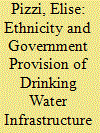

|
|
|
|
|
| Summary/Abstract |
What areas of the country does the Chinese government prioritize for drinking water provision infrastructure? Chinese policy prioritizes ethnic minorities and minority autonomous areas due to concerns about inequality and interethnic harmony. However, the implementation is not always equitable or favorable for ethnic minorities. Drawing on a new data set of more than 10,000 drinking water projects, I explore how ethnicity and autonomy influence public goods provision in rural Guizhou Province. I find implementation concerns trump official policy priorities when it comes to drinking water infrastructure. Such facilities are more likely to be built in Han-majority areas, because implementation and project completion are easier for officials. The findings have implications for ethnic politics and public goods provision in nondemocratic contexts. They also demonstrate why regions with larger minority populations are often slower to develop and slower to receive better access to basic public services.
|
|
|
|
|
|
|
|
|
|
|
|
|
|
|
|
| 16 |
ID:
120834
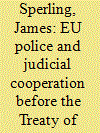

|
|
|
|
|
| Publication |
2013.
|
| Summary/Abstract |
Three key questions arise from the encroachment of the European Union (EU) on national prerogatives in the administration of justice: What factors contribute to the weakest link collective action problem attending police and judicial cooperation within the EU? What were the substantive and institutional goals of the EU in this policy domain? What accounts for the rising level of police and judicial cooperation despite the persistence of barriers to cooperation and incentives to defect? This article first establishes the fundamental incentives and obstacles to cooperation in matters of transnational security threats in post-Westphalian Europe. It then proceeds to explore the evolution of police and judicial cooperation in Justice and Home Affairs between 1999 and 2009, to assess national contributions to police and judicial cooperation, and to consider the potential impact that the changes introduced by the Lisbon Treaty, Stockholm Programme and European Investigation Order. A final question is considered in the conclusion: Did the level and extent of police and judicial cooperation that emerged between 1999 and 2009 give rise to a community of practice that in turn fostered a nascent community of identity resilient enough to mitigate the weakest link technology of public goods production endemic to this policy domain?
|
|
|
|
|
|
|
|
|
|
|
|
|
|
|
|
| 17 |
ID:
120827
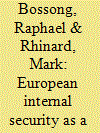

|
|
|
|
|
| Publication |
2013.
|
| Summary/Abstract |
This introduction argues for a new research agenda on European internal security cooperation from the perspective of public goods. We set out our case in three parts. First, we identify new empirical puzzles and demonstrate significant explanatory gaps in the existing internal security literature which public goods theory could help address. Second, we outline the building blocks of a public goods approach and provide an overview of its application, both existing and potentially, in various areas of regional security and European integration. Third, we present three complementary ways of using public goods theory to analyse internal security in the European Union, with the aim of spurring new research questions while accepting some limitations of this theoretical approach.
|
|
|
|
|
|
|
|
|
|
|
|
|
|
|
|
| 18 |
ID:
120836


|
|
|
|
|
| Publication |
2013.
|
| Summary/Abstract |
In recent years the European Union has taken a number of steps towards improving civil protection cooperation in Europe. European leaders regularly declare the importance of boosting cooperation to prepare for and respond to disasters and emergencies afflicting member states. Those declarations have been accompanied by a flourish of policy activity, the building of new structures, and even treaty changes. On the surface, this little-known area of European integration appears to be proceeding with great success. A closer look, however, reveals significant gaps between member states' general expressions of enthusiasm and problematic cooperation in practice. We draw upon public goods theory to explain why this might be the case; more specifically, we identify likely game-theoretic obstacles to cooperation in different areas of the civil protection field. We evaluate our theoretical propositions by examining the current state of cooperation in marine pollution response, chemical contamination management, and flood response. We find that cooperation success in practice corresponds generally, but not perfectly, with the predictions of public goods theory. Our findings offer a nuanced view of civil protection cooperation in Europe and illuminate options for improved cooperation in the future.
|
|
|
|
|
|
|
|
|
|
|
|
|
|
|
|
| 19 |
ID:
119410
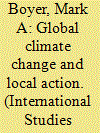

|
|
|
|
|
| Publication |
2013.
|
| Summary/Abstract |
Climate change is the signature global issue of our time. This is not just because of climate change itself, but also because of the host of socioeconomic and physical impacts that will result from rising temperatures globally. But fundamentally for scholars of international relations, climate change confronts the policy limitations of sovereignty and its implications for global action directly. Because of the lack of effective global and even national climate change policy action, policy initiatives to confront climate change must focus on levels below the global, even though economic models suggest that global policy provision might be the most efficient way to target the implications of climate change. Thus, this study centers on the complexity of climate change policymaking by focusing attention on the evolution of climate change policy action in the New England region, the State of Connecticut, and its municipalities.
|
|
|
|
|
|
|
|
|
|
|
|
|
|
|
|
| 20 |
ID:
054672


|
|
|
|
|
| Publication |
Cambridge, Cambridge University Press, 2004.
|
| Description |
xiii, 299p.
|
| Standard Number |
0521542545
|
|
|
|
|
|
|
|
|
|
|
|
Copies: C:1/I:0,R:0,Q:0
Circulation
| Accession# | Call# | Current Location | Status | Policy | Location |
| 048855 | 327.116/SAN 048855 | Main | On Shelf | General | |
|
|
|
|
|
|
|
|
|